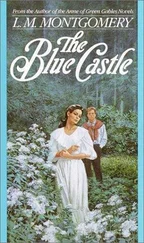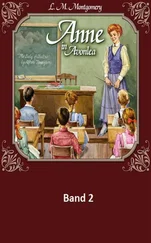"You make me believe in fairies, whether I will or no," he told her, "and that means youth. As long as you believe in fairies you can't grow old.”
"But I can't believe in fairies myself," protested Emily sorrowfully. "I wish I could.”
"But YOU are a fairy yourself — or you wouldn't be able to find fairyland. You can't buy a ticket there, you know. Either the fairies themselves give you your passport at your christening — or they don't. That is all there is to it.”
"Isn't 'Fairyland' the LOVELIEST word?" said Emily dreamily.
"Because it means everything the human heart desires," said Dean.
When he talked to her Emily felt as if she were looking into some enchanted mirror where her own dreams and secret hopes were reflected back to her with added charm. If Dean Priest were a cynic he showed no cynicism to Emily. But in her company he was not a cynic; he had shed his years and became a boy again with a boy's untainted visions. She loved him for the world he opened to her view.
There was such fun in him, too — such sly, surprising fun. He told her jokes — he made her laugh. He told her strange old tales of forgotten gods who were very beautiful — of court festivals and the bridals of kings. He seemed to have the history of the whole world at his fingers' ends. He described things to her in unforgettable phrases as they walked by the bay shore or sat in the overgrown, shadowy old garden of Wyther Grange. When he spoke of Athens as "the City of the Violet Crown" Emily realized afresh what magic is made when the right words are wedded; and she loved to think of Rome as "the City of the Seven Hills." Dean had been in Rome and Athens — and almost everywhere else.
"I didn't know any one ever talked as you do except in books," she told him.
Dean laughed — with a little note of bitterness that was so often present in his laughter — though less often with Emily than with other people. It was really his laughter that had won Dean his reputation for cynicism. People so often felt that he was laughing AT them instead of WITH them.
"I've had only books for companions most of my life," he said. "Is it any wonder I talk like them?”
"I'm sure I'll like studying history after this," said Emily; "except Canadian History. I'll never like IT — it's so dull. Not just at the first, when we belonged to France and there was plenty of fighting, but after that it's nothing but politics.”
"The happiest countries, like the happiest women, have no history,” said Dean.
"I hope I'll have a history," cried Emily. "I want a THRILLING career.”
"We all do, foolish one. Do you know what makes history? Pain — and shame — and rebellion — and bloodshed and heartache. Star, ask yourself how many hearts ached — and broke — to make those crimson and purple pages in history that you find so enthralling. I told you the story of Leonidas and his Spartans the other day. They had mothers, sisters and sweethearts. If they could have fought a bloodless battle at the polls wouldn't it have been better — if not so dramatic.”
"I — can't — FEEL — that way," said Emily confusedly. She was not old enough to think or say, as she would say ten years later, "The heroes of Thermopylae have been an inspiration to humanity for centuries. What squabble around a ballot-box will ever be that?”
"And, like all female creatures, you form your opinions by your feelings. Well, hope for your thrilling career — but remember that if there is to be drama in your life SOMEBODY must pay the piper in the coin of suffering. If not you — then someone else.”
"Oh, no, I wouldn't like THAT.”
"Then be content with fewer thrills. What about your tumble over the bank down there? That came near being a tragedy. What if I hadn't found you?”
"But you DID find me," cried Emily. "I like near escapes — after they're over," she added. "If everybody had always been happy there'd be nothing to read about.”
Tweed made a third in their rambles and Emily grew very fond of him, without losing any of her loyalty to the pussy folk.
"I like cats with one part of my mind and dogs with another part,” she said.
"I like cats but I never keep one," Dean said. "They're too exacting — they ask too much. Dogs want only love but cats demand worship. They have never got over the Bubastis habit of godship.”
Emily understood this — he had told her all about old Egypt and the goddess Pasht — but she did not quite agree with him.
"Kittens don't want to be worshipped," she said. "They just want to be cuddled.”
"By their priestesses — yes. If you had been born on the banks of the Nile five thousand years ago, Emily, you would have been a priestess of Pasht — an adorable, slim, brown creature with a fillet of gold around your black hair and bands of silver on those ankles Aunt Nancy admires, with dozens of sacred little godlings frisking around you under the palms of the temple court.”
"Oh," gasped Emily rapturously, "that gave me THE FLASH. And," she added wonderingly, "just for a moment it made me HOMESICK, too.
Why?”
"Why? Because I haven't a doubt you WERE just such a priestess in a former incarnation and my words reminded your soul of it. Do you believe in the doctrine of the transmigration of souls, Star? But of course not — brought up by the true-blue Calvinists of New Moon.”
"What does it mean?" asked Emily, and when Dean explained it to her she thought it a very delightful belief but was quite sure Aunt Elizabeth would not approve of it.
"So I won't believe it — yet," she said gravely.
Then it all came to an end quite suddenly. It had been taken for granted by all concerned that Emily was to stay at Wyther Grange until the end of August. But in mid-August Aunt Nancy said suddenly to her one day: "Go home, Emily. I'm tired of you. I like you very well — you're not stupid and you're passably pretty and you've behaved exceedingly well — tell Elizabeth you do the Murrays credit — but I'm tired of you. Go home.”
Emily's feelings were mixed. It hurt her to be told Aunt Nancy was tired of her — it would hurt any one. It rankled in her for several days until she thought of a sharp answer she might have made Aunt Nancy and wrote it down in her Jimmy-book. She felt quite as relieved then as if she had really said it.
And she was sorry to leave Wyther Grange; she had grown to love the old beautiful house, with its flavour of hidden secrets — a flavour that was wholly a trick of its architecture, for there had never been anything in it but the simple tale of births and deaths and marriages and everyday living that most houses have. She was sorry to leave the bay shore and the quaint garden and the gazing-ball and the chessy-cat and the Pink Room bed of freedom; and most of all she was sorry to leave Dean Priest. But on the other hand it was delightful to think of going back to New Moon and all the loved ones there — Teddy and his dear whistle, Ilse and her stimulating comradeship, Perry with his determined reaching up for higher things, Saucy Sal and the new kitten that must be needing proper training now, and the fairy world of the Midsummer Night's Dream.
Cousin Jimmy's garden would be in its prime of splendour, the August apples would be ripe. Suddenly, Emily was very ready to go.
She packed her little black box jubilantly and found it an excellent chance to work in neatly a certain line from a poem Dean had recently read to her which had captured her fancy.
"'Good-bye, proud world, I'm going home,'" she declaimed feelingly, standing at the top of the long, dark, shining staircase and apostrophizing the row of grim Priest photographs hanging on the wall.
But she was much annoyed over one thing. Aunt Nancy would not give her back the picture Teddy had painted.
Читать дальше


